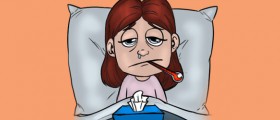The common cold is a viral infection affecting the nasal cavity and nasopharynx, to be more precise, the mucous membrane of almost all parts of the upper respiratory tract. In the majority of cases, the condition is caused by rhinoviruses and coronaviruses. Infection develops in a form of malaise accompanied by cough, sore throat, runny nose, and fever.
Can Cold be Cured Forever?
There is no cure for the common cold. However, there are certain remedies that can efficiently reduce the intensity of unpleasant symptoms patients have to deal with. The length of the infection may be sometimes reduced as well. And finally, with adequate rest and by following doctor's orders one successfully prevents some complications of the diseases.

The Common Cold Treatments
Symptoms of the common cold last approximately 7-10 days and in some individuals, they may even linger for several weeks. In spite of the fact that all of them are quite unpleasant and frustrating at the beginning of the infection, there is no way to eliminate them completely.
The first thing a person suffering from the common cold should do is stay in bed. By having sufficient time to rest and plenty of sleep the body will be more capable of regenerating. Furthermore, all patients are due to drinking plenty of water. Intake of fluids may also include soups, tea, and fruit juices. A sufficient amount of fluids prevents dehydration and also helps with overall congestion.
Medications
Symptomatic treatment for the common cold includes several types of drugs. Antipyretics are generally taken in case of very high body temperature. There are plenty of antipyretics to choose from. Still, small children must never be administered Aspirin, because it may in case of viral infection (which is the case with the common flu) induce a serious condition called Reye's syndrome. Antipyretics are available over-the-counter or may be prescribed by the doctor.
Nasal decongestants are drugs that deal with nasal congestion. They are quite efficient and allow patients to breathe normally. But, such drugs must not be used for more than several days and people with certain comorbidities (high blood pressure, heart conditions, prostate problems, etc.) are better to consult their healthcare provider prior to opting for this type of medicine.
Cough suppressants are prescribed if one has a dry cough and antihistamines may be efficient in some patients while others fail to respond to these medications.
The Common Cold Remedies
Apart from symptomatic treatment, patients are also recommended to adapt their diet. For instance, they should consume food rich in all the necessary vitamins and minerals, particularly vitamin C and zinc. The last two are particularly good against the common cold.
Finally, there are plenty of herbs one may benefit from. Some of them are lemongrass, ginger, red pepper, eucalyptus, and Echinacea.
- Children under two years have about six infections a year, adults two to three and older people about one per year. Stress and poor sleep may increase the risk of the common cold among adults, whereas attendance at a daycare centre increases the risk among preschool children.
- Rhinovirus accounts for 24%–52% of clinical cases or 52%–76% of infections with an identified pathogen. No pathogen is identified in 31%–57% of upper respiratory tract infections, likely because of a host of reasons, including poor collection technique, low pathogen count due to sampling late in the illness, or previously unidentified agents. Only about 5% of clinically diagnosed cases were found to have bacterial infection (with or without viral co-infection).
- Although self-limiting, the common cold is highly prevalent and may be debilitating. It causes declines in function and productivity at work and may affect other activities such as driving. Its impact on society and health care is large. Of individuals with an upper respiratory tract infection, 7%–17% of adults and 33% of children visit a physician. Upper respiratory tract infections result in an estimated increase of 12.5% in patient visits per month during cold and flu season.
- Zinc appears to be effective in reducing the number of colds per year, at least in children. A Cochrane review of the prophylactic efficacy of orally administered zinc considered two RCTs that we also examined individually. These studies had methodologic concerns and included only children given zinc sulfate 10 mg or 15 mg daily.
- Probiotics may be helpful in preventing upper respiratory tract infections, but the interventions and evidence are inconsistent. A systematic review of 14 RCTs included 10 trials (n = 3451) that provided sufficient data for pooling. Pediatric and adult populations from a wide variety of countries were included.
- The role of ginseng in preventing colds is questionable.
- Antihistamines as monotherapy have no meaningful effect in the treatment of the common cold.
- Antihistamines combined with decongestants, analgesics or both appear to have a small to moderate effect on the common cold in older children and adults.
- Decongestants result in small improvements of uncertain clinical significance in nasal symptoms.
- Inhaled ipratropium bromide appears to improve cold symptoms, particularly rhinorrhea, with a moderate increase in adverse events such as epistaxis and dryness of the nose and mouth. A systematic review and meta-analysis of intranasal ipratropium bromide spray did not pool data because of variability in scales, measurements and other parameters.
- Over-the-counter cough suppressants are of no benefit for children, and Health Canada recommends against their use in children under the age of six years. For adults, the benefit is unclear but likely small.

















Your thoughts on this
Loading...